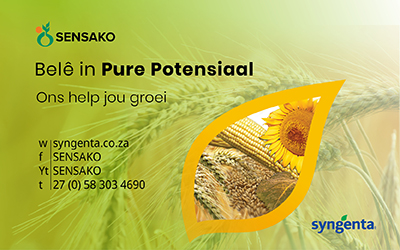
South Africa has a long track record with biotech seed and producers across the farming spectrum often choose this seed option even though it can be a major contributor to the cost of overall farming inputs. The widescale adoption of biotech maize, soybean and cotton has been delivering benefits to producers in South Africa for more than two decades.
While the primary biotech traits have been limited to insect resistance and herbicide tolerance, they have provided a direct advantage when it comes to the management of pests and weeds. Indirectly they also boost crop yields, offering producers greater flexibility with time and labour savings as well as reducing the need for pesticide applications in some cases.
In part, the continued success of biotech seed adoption is due to the enabling regulatory environment in terms of the Genetically Modified Organisms Act, 1997 (GMO Act, 1997). By having an operational regulatory framework in place, South African producers had an avenue to access biotech seed very early when compared to counterparts in other African regions.
The cultivation of biotech seed varieties has become a mainstay of our agri food production system as each year, millions of producers around the world plant biotech crops for better yields, improved crop quality and the ability to use sustainable farming practices such as no-till. However, bringing these innovative new traits from the lab to producers’ fields requires a considerable investment of time and resources.
 An updated study by CropLife International highlights that on average it takes an investment of $115 million and 16,5 years of research, development and regulatory approvals to deliver a new biotech trait to market. Click on the QR code to read more.
An updated study by CropLife International highlights that on average it takes an investment of $115 million and 16,5 years of research, development and regulatory approvals to deliver a new biotech trait to market. Click on the QR code to read more.
Considering these high investment costs and product development timelines, it is imperative that end users of biotech seed products exercise proper stewardship practices to ensure that trait technology continues to be effective and deliver expected benefits. In this regard, the sale of every bag of biotech seed with traits such as insect resistance (for example Bt crops) and herbicide tolerance (for example glyphosate-tolerant crops) goes hand in hand with a growers technology agreement (GTA) or technology use agreement (TUA). This is an agreement between the technology developer and the grower. The technology agreement serves to protect the investment of technology developers by placing obligations on growers regarding the following:
- Traited seed technology cannot be sold.
- Compliance with resistance management practices and other stewardship requirements for cultivation and marketing of insect-resistant and herbicide-tolerant crops.
- Participation in monitoring programmes (for example stewardship audits) by technology developers in compliance with annual reporting obligations under the GMO Act.
In return, the agreements place responsibility on seed developers to equip growers with the necessary knowledge on best stewardship practices to be followed when cultivating traited seed. This is facilitated through the provision of technology user guides that outline the conditions and requirements for cultivation of the specific traited seed variety.
As the 2023/2024 production season gets into full gear, producers need to ensure that they are armed with the right information regarding which seed varieties are most suitable for their growing conditions and production needs. While biotech seed gives our producers more tools and options, it comes with the responsibility of exercising proper stewardship in the form of resistance management and implementing good agricultural practices, thus ensuring the continued delivery of sustainable and long-term benefits to producers, the environment and food security.





























